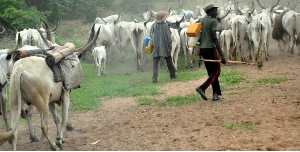The implementation of the Research for Development and Innovation Agriculture and Learning (ReDIAL) project has contributed to a significant reduction in nomadic herdsmen and farmers conflict in parts of the country.
Scores of people have lost their lives as result of farmer-herder conflicts especially in parts of the country Nkawkaw and Ejura over the past few years.
Speaking on the sidelines of a ReDIAL Project Close-out Workshop on the theme, “Transforming Ghana’s Agriculture through Innovation and Stakeholder Collaboration”, in Accra, Daniel Kofi Abu, Project Manager at Tropenbos said the project has been extremely beneficial.
"This conflict has been with us for ages. And usually, it stems from the fact that, there are a lot of nomads (fulani) who are coming from neighboring countries to Ghana during the season. And so for us as a project, we identify this as a very big issue to resolve."
''And so, one of the critical things that the project did was to engineers through a consultative process to see how best we can together address this issue. So, for instance, we got a chiefs as part of the multi-platform members, and so the chiefs were part of the decision-making process and that led to an action of providing bylaws.''
''These bylaws also indicate that you cannot just be roaming and then be grazing along like that, you need to have a place well prepared for your, your cattle. And so it has reduced a lot of cattle and farmer conflicts within these areas especially Donkorkrom," he said.
About ReDIAL project
The Research for Development and Innovation Agriculture and Learning (ReDIAL) is a 4year project in Ghana funded by the European Union (EU) and is implemented under the EU initiative on Climate-relevant Development Smart Innovation through Research in Agriculture1 (and food systems) in developing countries – DeSIRA. The ReDIAL project is contributing to transformation and innovation in agriculture and food systems in Ghana through action research, application of innovative technologies organization of farmers and organizing multi-stakeholder platforms for policy reforms.
Specifically, the project is fostering innovation in improving soil fertility in Ghana and innovative technology to improve the threshing of Grains and Cereals. The project is also promoting climate-resilient agriculture practices. The project has a gender perspective and provides support targeted at about 10,000 farmers with 60% being women and farmers with physical disabilities.
The project is being implemented in the following five (5) specific Districts/Municipals and Regions of Ghana: Yendi Municipal of the Northern Region, Techiman Municipality of the Bono East Region, Ejura-Sekyeredumase Municipal of the Ashanti Regi, Sefwi Wiawso District of the Western North Region and Kwahu Afram Plains North District of the Eastern Region.
The ReDIAL project was implemented by a consortium of three (3) partners made up of two (2) not-for-profit organizations: Friends of the Nation (FoN) the lead, Tropenbos Ghana (TBG) and one (1) research-based university; the Faculty of Renewable Natural Resources (FRNR) of Kwame Nkrumah University of Science and Technology (KNUST).
The project is supported by two private companies SAYeTECH (producers of Multi-Crop Threshing technology) and SESI Technologies (producers of the FarmSense soil nutrition testing Technology).
General News of Friday, 25 October 2024
Source: www.ghanaweb.com

















